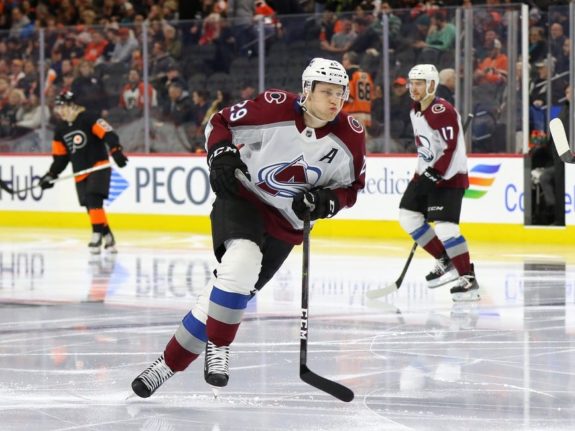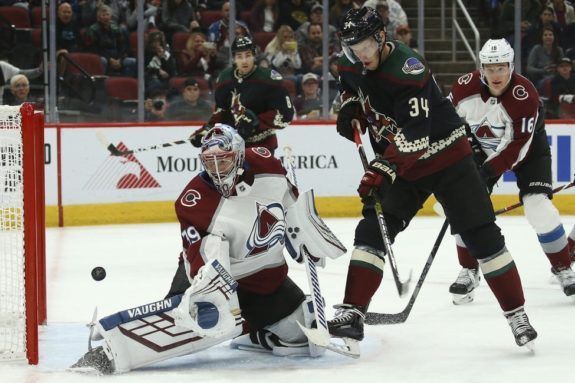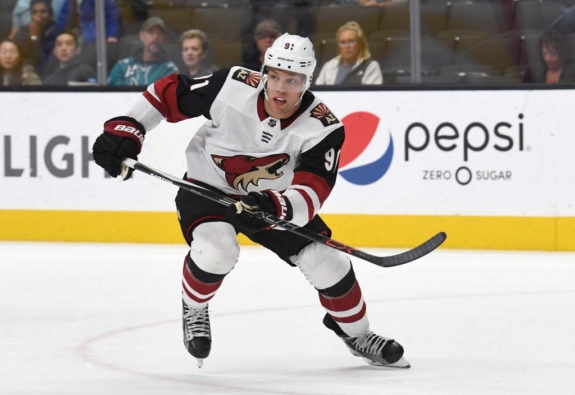
 Chris Haddad
The Hockey Writers
Chris Haddad
The Hockey Writers
48
Reads
0
Comments
Avalanche Paths to Signing a Top Free Agent
The 2020 free agent pool lacks much scoring depth outside of a few players: LW Taylor Hall (Arizona Coyotes), RW Mike Hoffman (Florida Panthers), RW Evgenii Dadonov (Panthers), and RW Tyler Toffoli (Vancouver Canucks). The Colorado Avalanche have solid top-six forwards, but many of them missed significant time this season with injuries. The organization has many personnel decisions to make over the next several years, and should have the cap space to sign free agents if it so wishes.
The Avalanche’s in-house players and prospects are deep enough to annually compete for the Stanley Cup. They do have assets with mid-range contracts that they could move to open roster spots and clear salary if they choose to pursue free agents. However, they need to exercise some caution because they’ll need to extend at least Nate MacKinnon, Gabriel Landeskog, and Cale Makar within the next few seasons.

I’m not advocating for the team to sign anyone – nor do I really want them to or think they will – but this piece can serve as a possible road map for the team’s moves this offseason.
The Avalanche Salary Cap Situation
I linked the team’s full salary cap hit situation (“hit” from now on) above but it’s convenient to refer to 2019-21 with the table below. I expand on the non-roster, restricted free agent (RFA), and unrestricted free agent (UFA) situations in Tables 2-4.
| Player Name | POS | 2020 Situation* | 2019-20 Hit | 2020-21 Hit |
| Rantanen, Mikko | RW | $9,250,000 | $9,250,000 | |
| MacKinnon, Nathan | C, RW | $6,300,000 | $6,300,000 | |
| Landeskog, Gabriel | LW | $5,571,429 | $5,571,429 | |
| Kadri, Nazem | C | $4,500,000 | $4,500,000 | |
| Donskoi, Joonas | RW | $3,900,000 | $3,900,000 | |
| Compher, J.T. | RW, C | $3,500,000 | $3,500,000 | |
| Burakovsky, André | LW, RW | RFA | $3,250,000 | $3,500,000 |
| Calvert, Matt | LW, RW | $2,850,000 | $2,850,000 | |
| Wilson, Colin | C, LW | UFA | $2,600,000 | $- |
| Nieto, Matt | LW, RW | UFA | $1,975,000 | $1,975,000 |
| Bellemare, Pierre-Édouard | LW, C | $1,800,000 | $1,800,000 | |
| Namestnikov, Vladislav | RW, LW, C | UFA | $1,350,000 | $- |
| Jost, Tyson | C, LW, RW | RFA | $885,833 | $1,000,000 |
| Nichushkin, Valeri | LW, RW | RFA | $850,000 | $1,500,000 |
| Kamenev, Vladislav | C | RFA | $750,000 | $- |
| Bowers, Shane | C | Non-roster | $- | $925,000 |
| Kaut, Martin | RW | Non-roster | $- | $894,167 |
| SUBTOTAL – FORWARDS | $49,332,262 | $47,465,596 |
| Player Name | POS | 2020 Situation | 2019-20 | 2020-21 |
| Johnson, Erik | RD | $6,000,000 | $6,000,000 | |
| Cole, Ian | LD | $4,250,000 | $4,250,000 | |
| Zadorov, Nikita | LD | RFA | $3,200,000 | $- |
| Barberio, Mark | LD | UFA | $1,450,000 | $- |
| Connauton, Kevin | LD | UFA | $1,375,000 | $800,000 |
| Makar, Cale | RD | $880,833 | $880,833 | |
| Graves, Ryan | LD | RFA | $735,000 | $2,000,000 |
| Girard, Samuel | LD | $728,333 | $5,000,000 | |
| Byram, Bowen | RD | Non-roster | $- | $925,000 |
| Timmins, Conor | RD | Non-roster | $- | $925,000 |
| SUBTOTAL – DEFENSE | $18,619,166 | $20,780,833 |
| Player Name | POS | 2020 Situation | 2019-20 | 2020-21 |
| Grubauer, Philipp | G | $3,333,333 | $3,333,333 | |
| Francouz, Pavel | G | $950,000 | $2,000,000 | |
| Hutchinson, Michael | G | UFA | $700,000 | $700,000 |
| SUBTOTAL – GOALIES | $4,983,333 | $6,033,333 |
| Player Name | 2019-20 | 2020-21 | ||
| Orpik, Brooks | $1,500,000 | $- | ||
| SUBTOTAL – BUYOUTS | $1,500,000 | $- |
| 2019-20 | 2020-21 | |||
| TOTAL SALARY CAP HIT | $74,434,761 | $74,279,762 | ||
| EXPECTED NHL CAP | $81,500,000 | $86,100,000 | ||
| TOTAL CAP SPACE | $7,065,239 | $11,820,238 |
The cap table is organized by position and descends by 2019-20 hit. All the data is from The Hockey Writers’ salary cap site except for Namestnikov because I had to pro-rate his hit to represent his Avalanche service time. Also, for convenience, I am reflecting players as if they were active and not on the injury list. It doesn’t change the cap hit amounts – I just don’t include that table section like the website does.
The different Namestnikov data is the only reason why the Forwards and Total Cap Space numbers are different. Non-rostered players’ salaries do not contribute to a team’s hit, which is why they are zeroed in 2019-20. For the 2020-21 Expected NHL Cap, I averaged the expected range ($84 – $88.2 million) to get to $86.1 million.
Under these conditions, the forwards’ hit would decrease next season because we’d replace free agents Wilson, Namestnikov, and Kamenev with in-house options Bowers, Kaut, and the return of injured players like Calvert. On defense, Samuel Girard’s seven-year, $35 million extension kicks in next season, so that’s why that group’s hit increases. I expect GM Joe Sakic to replace Barberio and Zadorov with Timmins and Byram, respectively. Tom Hunter, the managing editor of Mile High Hockey, agrees:
Francouz is receiving a $1 million raise next season so the goalie hit rises but Orpik’s buyout (acquired with Grubauer in 2018) is off the books after this season, negating the effect of Francouz’s increase. Overall, I expect the team’s hit next season to roughly equal that of 2019-20. The additional $4.6 million in space is due to the increased NHL cap for 2020-21.
Related: How Much Do Players Get Paid in the Playoffs?
Table 2 below contains the list of players I expect the Avalanche to extend/tender. Approximately half of the difference between this season’s and next season’s hit is from non-rostered players earning spots on the Avalanche: Bowers, Byram, Kaut, and Timmins.

I expect the largest rostered raises to go to RFAs Graves and Nichushkin, and an $800,000 ceiling for Connauton or his replacement. I’m not positive that Sakic resigns Hutchinson, but I do not expect the third goalie to receive more than $700,000.
Table 2. Players receiving new contracts and/or roster spots in 2020-21
| Player | 2019-20 Actual Cap Hit | 2020-21 Possible Hit |
| Burakovsky, André | $3,250,000 | $3,500,000 |
| Nieto, Matt | $1,975,000 | $1,975,000 |
| Connauton, Kevin | $1,375,000 | $800,000 |
| Jost, Tyson | $885,833 | $1,000,000 |
| Nichushkin, Valeri | $850,000 | $1,500,000 |
| Graves, Ryan | $735,000 | $2,000,000 |
| Hutchinson, Michael | $700,000 | $700,000 |
| Bowers, Shane | $- | $925,000 |
| Byram, Bowen | $- | $925,000 |
| Timmins, Conor | $- | $925,000 |
| Kaut, Martin | $- | $894,167 |
| Total | $9,770,833 | $15,144,167 |
Table 3 is who I expect the organization to let walk (non-tender). I covered Nikita Zadorov and Vlad Kamenev in a previous article. Colin Wilson is expensive for a player who hasn’t played 80 games since 2013-14 or scored 40 points since 2014-15, and it’s rumored that Mark Barberio may have already reached an agreement to play in Switzerland.
Table 3. Players not receiving offers for 2020-21
| Player | 2019-20 Actual Cap Hit | 2020-21 Possible Hit |
| Zadorov, Nikita | $3,200,000 | $- |
| Wilson, Colin | $2,600,000 | $- |
| Barberio, Mark | $1,450,000 | $- |
| Kamenev, Vladislav | $750,000 | $- |
| Total | $8,000,000 | $- |
If the moves in Tables 2 & 3 occur, then the Avalanche will have the salary cap space to most likely afford any 2020 unrestricted free agent for the 2020-21 season. I think that it is more realistic that the Avalanche clear space by tendering/non-tendering contracts to its own players rather than trying to trade away its overpriced ones. Regardless of whether Sakic can trade away overpriced players like Ian Cole (remaining hit: one-year, $4.25 million) or Joonas Donskoi (three years at $3.9 million AAV), the organization will still need to address its complicated free agency situation.
A Chance in Outer Space: Taylor Hall
I’m expecting Taylor Hall to receive at least a seven-year, $70 million deal since he is the unquestioned top unrestricted free agent forward in this class. Try as he might, he probably won’t approach Artemi Panarin’s contract with the New York Rangers (seven years, $81.5 million, $11.6 million AAV) but should surpass Jeff Skinner’s deal of eight years, $72 million, $9 million AAV).

We’ve seen how complex the 2020 offseason will be before entertaining a top free agent. Unadjusted for free agents, non-rostered players, or Namestnikov, it’s estimated that the front office will begin the offseason with a hit of $59.1 million and 30 players under contract (this season we had 47). Next offseason – before any signings or extensions occur this season or next – we’ll have a hit of $40.5 million but only 14 players under contract (Table 4 below).
Table 4. Avalanche Team Hits 2020-2025
| Season | 2020-21 | 2021-22 | 2022-23 | 2023-24 | 2024-25 |
| Avalanche Hit | $59,135,595 | $40,450,000 | $33,950,000 | $14,250,000 | $14,250,000 |
| Standard Player Contracts (max 50) | 30 | 14 | 7 | 2 | 2 |
Imagine allocating so much hit to one player with so few under contract. Next, consider who hits UFA by 2024-25: Francouz, Grubauer, Johnson, Kadri, Landeskog, MacKinnon. Also, Makar will need an RFA extension at some point. From a business perspective, Hall does not make sense for the Avalanche.
Earthly Targets: Panthers and a Canuck
Panthers teammates Hoffman and Dadonov occupy the tier below Hall, with Hoffman edging out Dadonov for the clear-cut second-best free-agent forward available this summer. He’s a little younger and has a few more 55 to 60-point seasons to his credit (Dadonov played in the KHL from 2012 to 2017). Toffoli is probably the fourth-best free agent, ahead of Mikael Granlund on account of his disastrous stay in Nashville.
Here’s how Hoffman, Dadonov, and Toffoli have produced over the past four seasons (Table 5), and how that production compared to that of Brayden Schenn, Anders Lee, William Karlsson during 2015-19 (Table 6). That time frame is the four seasons immediately preceding those players signing the listed contracts.
Table 5. Games played, Points, and Point Shares for Hoffman, Dadonov, Toffoli, 2016-2020
| Player Name | Age* | Games | Points | Point Shares |
| Hoffman, Mike | 30 | 307 | 246 | 26.9 |
| Dadonov, Evgenii | 31 | 225 | 182 | 19.4 |
| Toffoli, Tyler | 28 | 295 | 159 | 17.3 |
Table 6. Games played, Points, and Point Shares for Schenn, Karlsson, Hoffman, Dadonov, 2015-2019
| Player Name | Age* | Games | Points | Point Shares | 2019-20 Contract | Contract AAV |
| Schenn, Brayden | 27 | 313 | 238 | 26.7 | 8-year, $52.0 million | $6.5 million |
| Lee, Anders | 29# | 325 | 201 | 24.6 | 7-year, $49.0 million | $7.0 million |
| Karlsson, William | 26 | 326 | 179 | 20.4 | 8-year, $47.2 million | $5.9 million |
| Kreider, Chris | 28 | 291 | 187 | 22.2 | 7-year, $45.5 million^ | $6.5 million |
#Lee signed his 2019-20 contract 2 days shy of his 29th birthday
^Kreider signed his contract in February 2020
It’s likely that Hoffman receives at least a $50 million contract for the next seven to eight seasons. He’s a little older than the 2019 class in Table 6, but his production is a touch better. Dadonov is the eldest of the Table 5 group and his NHL totals are lower than his teammate’s, but he has the best points/game mark (0.81 PPG vs 0.80 PPG for Hoffman vs 0.54 PPG for Toffoli). I think he gets $1 million less AAV and one to two years less in his deal than in Hoffman’s, such as a five-year, $32.5 million contract.
Related: Revisiting the Brayden Schenn Trade
On the other hand, Toffoli will probably get the years of the 2019 deals but not the AAV, so something like a seven-year, $35 million deal is a reasonable expectation. Of course, inflation due to a shallow top-six forward market may increase these players’ contracts more than expected.
All of the 2020 deals estimated above are more palatable for the Avalanche than Hall’s, but from a hockey perspective, they may not add much more scoring after the first two seasons than what the Avalanche already have in the pipeline. These players would knock neither Landeskog nor Rantanen from MacKinnon’s wing on the top line, so they’d be destined for the second-line.
With a fully healthy squad, that line currently is LW Burakovsky, C Kadri, RW Nichushkin. They would definitely add here in 2020-21 and possibly in 2021-22, when star prospect Alex Newhook is in his rookie season. But entering their third seasons with the team, it’s valid to question whether they would add more value than the second-year, 24-year old Newhook.
Avalanche Strategy
The current Avalanche roster is the result of prudent business operations and player development. In particular, they have proven adept at stocking their scoring lines with elite homegrown talent and shrewdly acquiring free agents as complementary pieces. Building their NHL roster by prioritizing the draft means that they have more opportunity to allocate their cap space to the right free agents.
Acquiring the best free agents takes long-term strategy and flexibility, of which the Avalanche have in droves. Sakic has built a monster in Denver and I expect him to forego top free agents this offseason because the team is still the strongest in the West without them.
The post Avalanche Paths to Signing a Top Free Agent appeared first on The Hockey Writers.
Popular Articles

















































 Blackhawks Chicago
Blackhawks Chicago Panthers Florida
Panthers Florida Penguins Pittsburgh
Penguins Pittsburgh Rangers New York
Rangers New York Avalanche Colorado
Avalanche Colorado Kings Los Angeles
Kings Los Angeles Maple Leafs Toronto
Maple Leafs Toronto Bruins Boston
Bruins Boston Capitals Washington
Capitals Washington Flames Calgary
Flames Calgary Oilers Edmonton
Oilers Edmonton Golden Knights Vegas
Golden Knights Vegas Flyers Philadelphia
Flyers Philadelphia Senators Ottawa
Senators Ottawa Lightning Tampa Bay
Lightning Tampa Bay Red Wings Detroit
Red Wings Detroit Islanders New York
Islanders New York Sabres Buffalo
Sabres Buffalo Devils New Jersey
Devils New Jersey Hurricanes Carolina
Hurricanes Carolina Stars Dallas
Stars Dallas Jets Winnipeg
Jets Winnipeg Blue Jackets Columbus
Blue Jackets Columbus Predators Nashville
Predators Nashville Wild Minnesota
Wild Minnesota Blues St. Louis
Blues St. Louis Mammoth Utah
Mammoth Utah Ducks Anaheim
Ducks Anaheim Sharks San Jose
Sharks San Jose Canucks Vancouver
Canucks Vancouver






